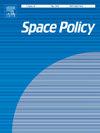轨道约束。太空准备状态 "和政府支持的预测因素
IF 1.9
4区 社会学
Q2 INTERNATIONAL RELATIONS
引用次数: 0
摘要
投资于空间部门的国家数目日益增加,但由于缺乏比较研究、统计分析和一些危险的误解,促成因素仍然被低估或误解。通过使用40年的面板数据集,并采用生存分析和预测数据挖掘(机器学习)等方法,文章表明,政府对民用和商业活动的支持,比军事和国防更能在国家空间部门的发展中发挥决定性作用,最终,它们是冒险进入低轨道和更远轨道的关键因素。本文章由计算机程序翻译,如有差异,请以英文原文为准。
Orbit Bound. Predictors of ‘readiness to space’ and government support
The number of countries investing in the space sector grows by the day but the enabling factors are still either underestimated or misunderstood, due to the lack of comparative research, statistical analysis, and a few, dangerous misconceptions. Working with a panel dataset of forty years and employing methods such as survival analysis and predictive data mining (machine learning), the article shows that government support of civilian and commercial activities, more than military and defence, play a determinant role in the development of a national space sector and they are, eventually, the key factors for venturing to lower orbit and beyond.
求助全文
通过发布文献求助,成功后即可免费获取论文全文。
去求助
来源期刊

Space Policy
Multiple-
CiteScore
3.40
自引率
36.40%
发文量
40
期刊介绍:
Space Policy is an international, interdisciplinary journal which draws on the fields of international relations, economics, history, aerospace studies, security studies, development studies, political science and ethics to provide discussion and analysis of space activities in their political, economic, industrial, legal, cultural and social contexts. Alongside full-length papers, which are subject to a double-blind peer review system, the journal publishes opinion pieces, case studies and short reports and, in so doing, it aims to provide a forum for the exchange of ideas and opinions and a means by which authors can alert policy makers and international organizations to their views. Space Policy is also a journal of record, reproducing, in whole or part, official documents such as treaties, space agency plans or government reports relevant to the space community. Views expressed in the journal are not necessarily those of the editors or members of the editorial board.
 求助内容:
求助内容: 应助结果提醒方式:
应助结果提醒方式:


